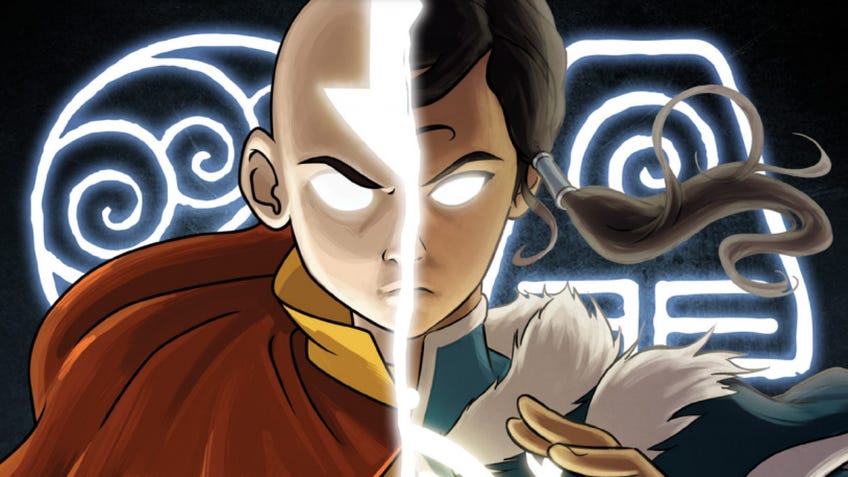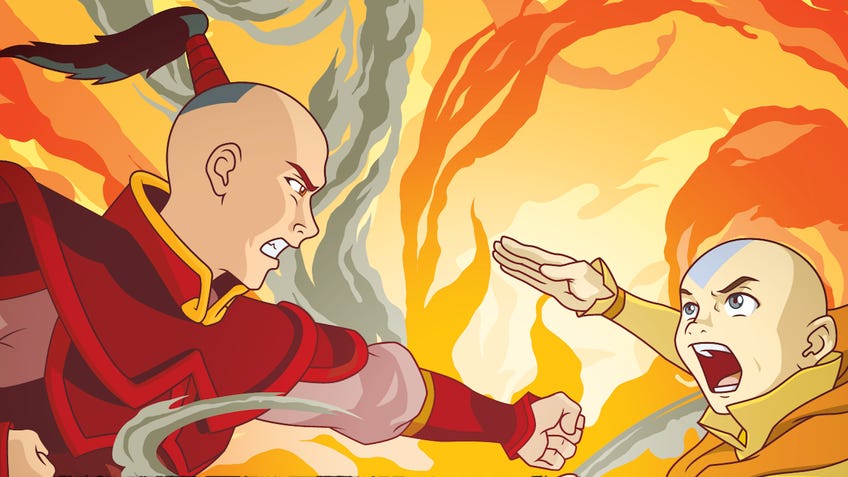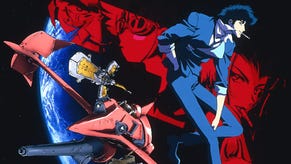Avatar Legends RPG designers were prepared for success, but nearly $10m on Kickstarter changed things
Magpie Games talks supply chain logistics, shielding design from bloat and contributor pay.
Hardly anyone was surprised when Avatar Legends, the tabletop RPG adaptation of American animated series Avatar: The Last Airbender and Legend of Korra, demolished its initial funding goal and hit six figures within the first day of its month-long Kickstarter campaign.
The studio behind the project, Magpie Games, told Dicebreaker in an interview that the still-active popularity of the mid-2000s show, in addition to an official partnership with rights owner ViacomCBS, promised a certain measure of success. Prior to the crowdfunding campaign’s launch, its employees had been working for six months on more than 25 stretch goals, assuming backers would eventually contribute something close to $3 million by the end.
“A lot of what has happened since that second day has been trying to readjust our expectations away from what we thought would maybe be a record breaking campaign on day 28 to what has now become a record-breaking campaign on day two. That was shocking for us,” said Mark Diaz Truman, Magpie Games’ CEO.
As of September 2nd, Avatar Legends had amassed $9,535,317 (around £6.9 million) and set a record for the highest earning tabletop RPG on Kickstarter. Diaz Truman said once the bewilderment settled, the team began reassessing how its ten full-timers, plus contributors, would now handle a project fulfillment ten times larger than Magpie’s previous games.
The New Mexico-based company sits in an interesting position within the tabletop industry. Smaller than giants Wizards of the Coast and Paizo, neither is it a scrappy indie outfit living or dying by each release. Its catalogue contains breakaway hits such as Bluebeard’s Bride and Masks: A New Generation alongside more niche titles Cartel and Urban Shadows. It also previously Kickstarted Root: The Tabletop RPG - based on Leder Games’ popular board game - to the tune of $600,000 (£435,000).
“The bigger the toy is the bigger the responsibility, right? So, we worked with Root and had an approvals process with Leder Games, but they're a small team like us,” Diaz Truman said. “They had a lot of places where we helped them build the world, and they had to answer questions they never thought of before. But when it comes to Avatar, these are giant kaiju-sized toys.”

Fans and players were initially pleased to see a licensed TRPG that wasn’t just another reskinned D&D 5E - Magpie’s house style favours a Powered by the Apocalypse toolkit based on Meguey and Vincent Baker’s Apocalypse World. As the money kept pouring in, Magpie felt obliged to offer upgrades, additions and extras that would enrich play, but fast approached the ceiling of what its design team could handle.
Senior designer Brenden Conway spoke about how the runaway success affected him and the design team responsible for creating mechanics and writing the adventures and lore that comprises Avatar Legends’ core book. More specifically, he said project manager Liz Chaipraditkul shielded them from as much added stress and expectation as possible.
That’s the main reason why backers saw the adventures and additional playbooks run dry as the ticker marched past the next few million-dollar goal lines - negotiations with ViacomCBS, printers and partnered manufacturers meant every new addition threatened an already tenuous timeline. Beyond that, Conway did not want to jeopardise the quality of the game itself.
The bigger the toy is the bigger the responsibility, right? When it comes to Avatar, these are giant kaiju-sized toys.
“At some point, we’re not able to put things through their paces, thoroughly review them internally or do the countless other little endeavours that we have discovered make the difference between a really polished, strong, sturdy design that can be iterated upon, and something that's a little haphazard and shaky, and might collapse,” Conway said.
Diaz Truman wouldn't elaborate on the details of the contracts Magpie signed with ViacomCBS in 2020 except to say the company started a “multi-year process” to ensure books shipped on time in 2022. Surprisingly, that date did not shift even as other tabletop companies delayed or outright cancelled projects due to exorbitantly inflated costs on shipping containers and delays exacerbated by pandemic-borne labour shortages.
The company was apparently somewhat insulated from economic shock thanks to early logistical planning. Upgrading its production and distribution infrastructure, alongside the rigid approvals process when working with a corporate entity, transformed a debilitating blow into something it could shrug off even as the number of backers continued to mount. Diaz Truman summed it up by saying the space between 20,000 and 50,000 printed books felt smaller than the difference between 1,000 and 8,000.
In the wake of Avatar Legends’ success, it was common to see people discuss where all the crowdfunded money would go. It’s a good question - how does a massive monetary influx change the studio itself and not just its current game? In short, the team said $9.5 million doesn’t stretch quite as far as one might imagine.
“People don't understand that our printing bill is going to be, you know, a seven-figure printing, right?” Diaz Truman responded. This was another subject somewhat bound by corporate agreements, but he said licensing and commissions for agents, lawyers and other officials would eat a significant piece of the crowdfunded pie - promised money that allows Magpie to even touch the Avatar universe in the first place.
Shipping grabs another fairly thick slice for all the reasons discussed earlier. The campaign already added a tier that will ship later than the rest due to production restrictions on the part of metal dice manufacturer Level Up Dice. “We are likely subsidising almost every shipping package going out the door because we're trying to offer the fairest various shipping price we can while acknowledging that prices are going up and up and up,” Diaz Truman said.
The final big expense was advertising, which the team readily admits was a major contributor to the Kickstarter’s record-setting run. Executing online ads through Facebook, Google and related sites isn’t an uncommon practice for tabletop RPG projects of a certain size, but Avatar Legends pushed that envelope in order to target prospective players outside the community and reach fans who might try tabletop games for the first time with the RPG.
Labour justice is so central to our work that we think it's a little weird for us to proclaim that we're doing this thing when we see it as something we try to shoot for every single day.
Chaipraditkul said her hiring, among Magpie’s other recent staffing, was another direct effect of the Kickstarter’s success. She owns TRPG studio Angry Hamster Games and is all too familiar with the professional precarity designers often face. “The one thing I thought when we made this much money was, ‘Oh, my god. I have a job for the future.’ When you enter into a normal business, outside the industry, that is your assumption: you're going to be able to grow with the business, you're gonna have a job for the next 10 years. But that's not the reality in the roleplay industry,” she said.
“We have done our best to take care of everybody that's involved in the project and pay them well from minute one, because we knew it'd be successful,” Diaz Truman added. “But more importantly, because it was the right thing to do. And it's always the right thing to do to pay your people. We think that the labour costs of doing things, the value of labour, the value it brings to us, is enormous.”
Recently, smaller Kickstarter projects have been adding an increased pay stretch goal for contributors and partners in lieu of expanded content or additional features. The trend can offset the difficulty and danger in predicting a project’s popularity, while assuring everyone involved earns a commensurate cut. Asked why Magpie hadn’t done something similar for its several contributing writers and artists, Diaz Truman said the idea just doesn’t fit Magpie’s business model.

“We are talking with [the contributors] about what would be the right way to honour their contributions. But again, we will never tie that to a stretch goal because that's something we would do regardless of how successful the project was,” he said. “If that's the model that people are using, awesome, that's great. But labour justice is so central to our work that we think it's a little weird for us to proclaim that we're doing this thing when we see it as something we try to shoot for every single day.”
Dicebreaker reached out to several contributors for comment regarding pay rates for their work, their thoughts on increased compensation and whether or not Magpie was open to those conversations. None wanted to comment on the record for this article, but contributing designer Daniel Kwan did provide a statement on behalf of the group.
“We have been talking with Magpie Games about several of the issues you addressed with your questions, and we feel like this conversation is going in a positive direction. This campaign for Avatar Legends has been an unprecedented success so far and we’re excited to see how it unfolds,” he said.





